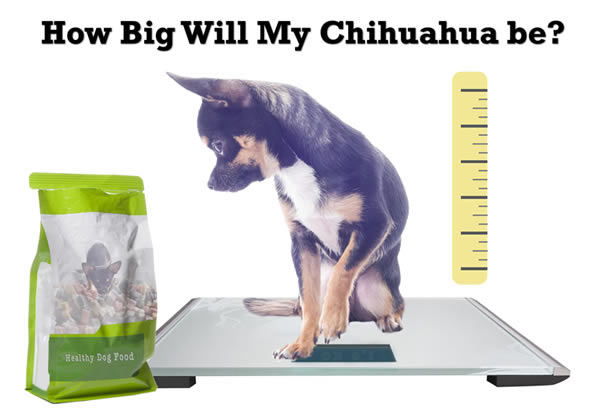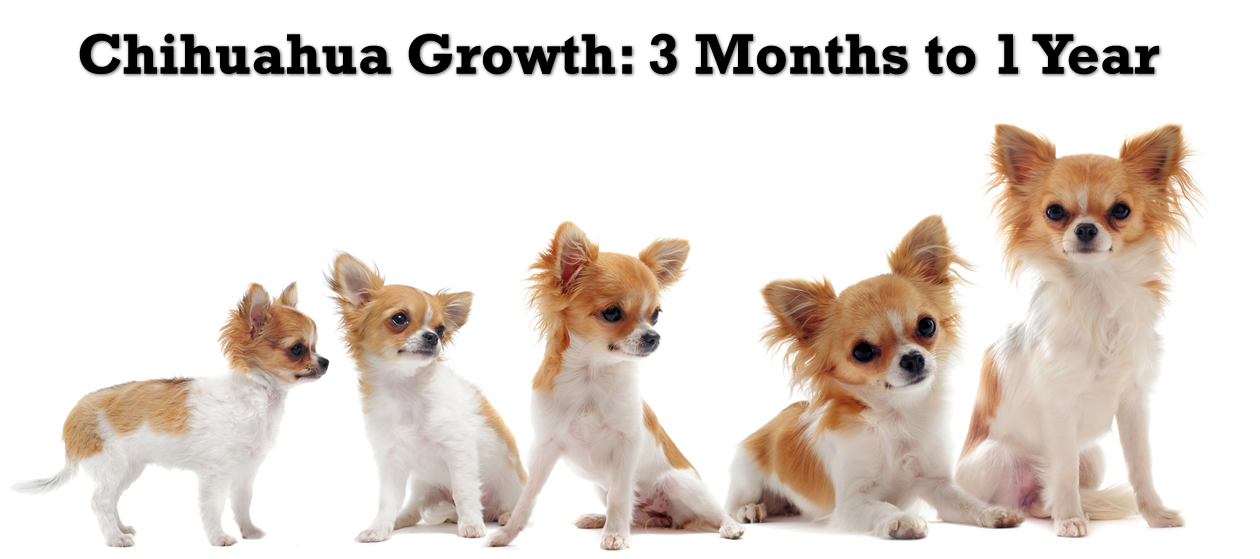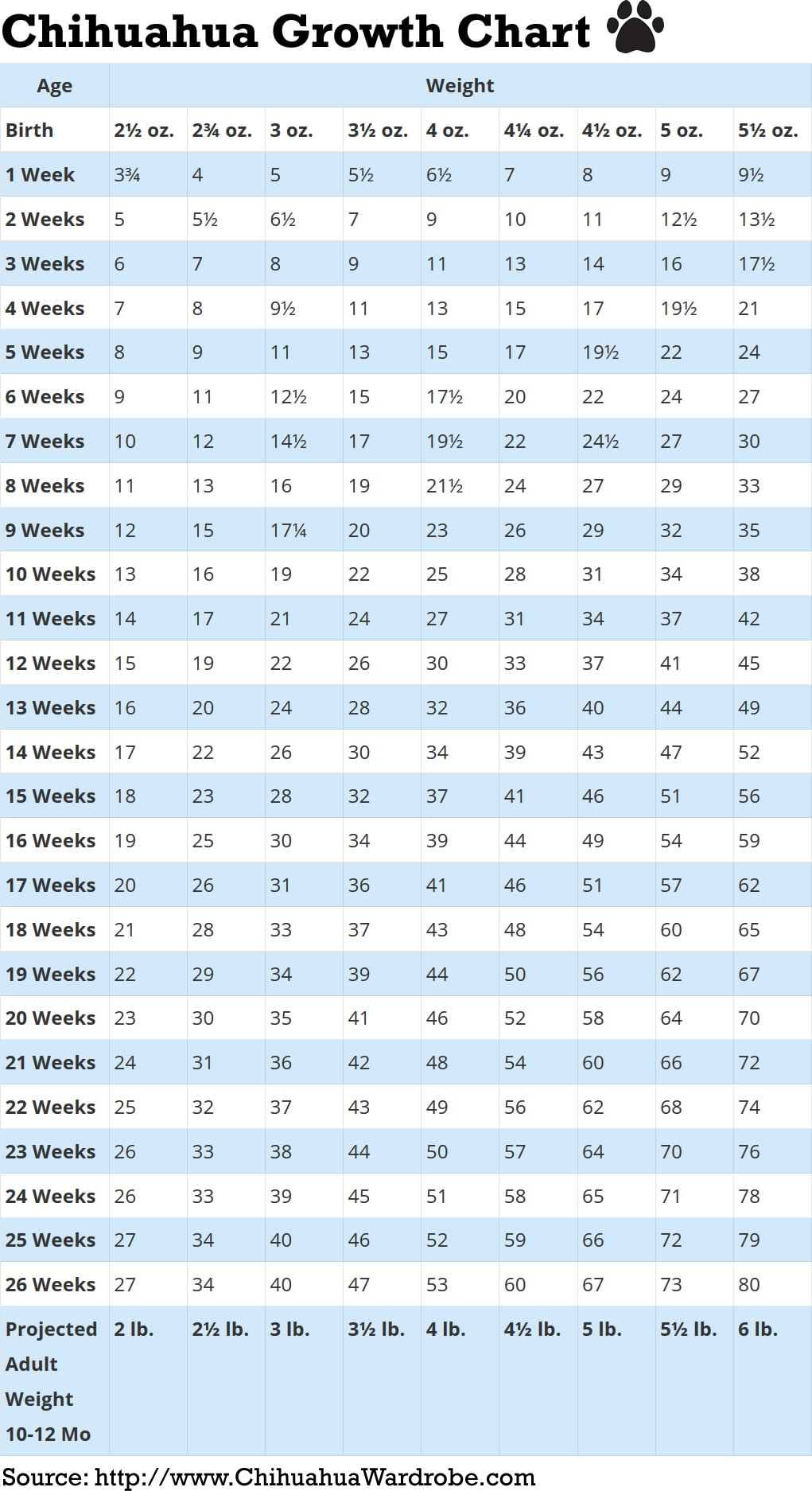
If you’re the proud owner of a Chihuahua puppy, you may wonder how big your furry friend will get.
Holding claim to the world’s smallest dog breed, Chihuahuas typically weigh between two and six pounds when fully grown. Of course, that’s a pretty wide range, leaving many owners pondering the following question: how big, or small, will by Chihuahua puppy get?
While you can look at the size of your pup’s paws and parents to help predict his future weight, this isn’t the most accurate method. Just because a puppy has small paws and small parents doesn’t necessarily mean he will be small when fully grown. Assuming he’s a pure-bred Chihuahua, however, you can typically predict a puppy’s adult weight by referring to the growth chart below.
Why Do I Need to Know My Pup’s Adult Size?
Predicting your Chihuahua pup’s future weight is important for several reasons, including the following:
- It helps owners make better decisions when choosing accessories such as crates, beds, collars, harnesses, leashes and clothes.
- Larger Chihuahuas need more food, water and exercise.
- Smaller Chihuahuas are more susceptible to physical injury.
- You can identify health problems early if your Chihuahua is under or overweight.
Chihuahua Puppy Growth: What to Expect
Emerging into this world without the sense of sight, smell or hearing, Chihuahua puppies are completely dependent on their mother for nourishment. For the next few weeks, they’ll spend 90% of their time sleeping and the remaining 10% nursing, allowing for substantial growth in a very short period of time.
- Birth to 2 Weeks: With an average weight of just 2½ to 5½ ounces and length of 3 to 4 inches, newborn Chihuahua puppies are small enough to fit inside the palm of your hand. They’ll grow rapidly during their first few weeks, however, often doubling in size while adding 5-10% of their body weight daily.
- 11 to 15 Weeks: Your Chihuahua puppy will likely experience a growth spurt during this period, adding considerable weight in just a couple of weeks.
- 3 Months: By the end of three months, your Chihuahua puppy will reach about 30% of his adult weight.
- 6 to 9 Months: Growth begins to slow down, with most Chihuahuas reaching their adult height of approximately 5.9 to 9.1 inches within 9 months. Your Chihuahua may still “fill out,” but he shouldn’t gain any significant amount of weight beyond this point.
- 10 to 12 Months: Like most toy breeds, Chihuahuas typically reach maturity and stop growing by 10 to 12 months. However, you can still expect your Chihuahua’s weight to fluctuate depending on his diet, health and physical activity levels.
How to Use the Growth Chart
The following growth chart predicts a pure-bred Chihuahua puppy’s adult weight based on his current weight.
- If you don’t already know your puppy’s current weight, use a digital kitchen scale to weigh him. For newborn pups, wait until the mother leaves her nesting area to avoid being bitten.
- Find your puppy’s current age on the left-hand column.
- Follow this row to the right until you find his current weight.
- Follow this column to the bottom where you’ll find his expected adult weight.
While this growth chart expresses weight in ounces and pounds, we’ve included a metric system conversion calculator below.
What Affects My Chihuahua’s Growth?
Assuming your Chihuahua is purebred, he will typically grow at the same pace as defined in the chart.
Note: some of the factors which may affect a Chihuahua puppy’s growth include:
- Genetics: The single most influential factor in determining a Chihuahua puppy’s rate of growth and subsequent adult size is genetics, including the type of genes present and the way in which those genes interact with one another. Because parents typically share the same genes as their pups, this is the basis on which growth charts work.
- Nutrition: Chihuahua puppies should receive all of the necessary nutrients — protein, amino acids, fatty acids, calcium, sugar, phosphorus, etc. — from their mother’s milk. After weaning off milk, however, they’ll need a well-balanced food to promote healthy growth and development. If a pup’s diet doesn’t include the right type and ratio of nutrients, he’ll grow more slowly.
- Physical Activity: While regular exercise is essential in building muscle and strong bones, too much can stunt a Chihuahua puppy’s growth. A pup’s leg bones grow from soft areas of undeveloped bone called growth plates (also known as epiphyseal plates). Intense and/or excessive physical activity can fracture these delicate structures, causing them to either stop growing or grow incorrectly
- Hormones: Growth hormone levels in a Chihuahua puppy will affect his growth. If a pup’s pituitary gland doesn’t produce enough of this vital hormone, he may grow more slowly to a smaller adult size.
- Health: Of course, the presence of disease and underlying health conditions can also affect a Chihuahua puppy’s growth. Parasites like roundworms, whipworms and hookworms live in the pup’s intestinal tract, restricting the pup’s nutritional intake and growth.
What Should I Do if My Chihuahua Puppy is Underweight?
Not all Chihuahua puppies follow the same cookie-cutter growth rate as defined in the chart above. Some grow more slowly than others — and that’s okay. If your Chihuahua consistently weighs less than he should, however, you should take precautions to ensure there’s no underlying health condition or problem to blame.
First, make sure you are feeding your pup “puppy” formulated dog food. It has a higher caloric content to meet pups’ growth demands. If your pup is still nursing, make his littermates aren’t restricting his access.
You should also ask the veterinarian to perform a physical examination of your pup when taking him to get his first vaccination (around 5 to 6 weeks). During this visit, the veterinarian can check to see if your pup is suffering from parasites, malnutrition or other problems that could stunt his growth.

Did this growth chart work for your Chihuahua? Let us know in the comments section below!
References:
http://www.akc.org/content/dog-care/articles/when-does-my-puppy-finish-growing/
